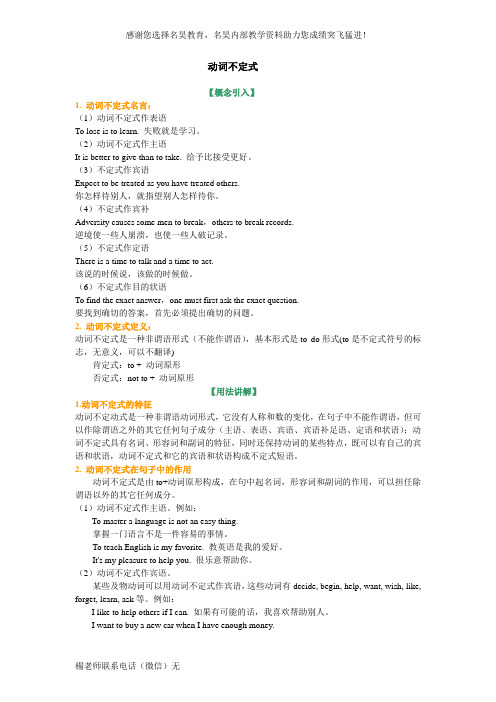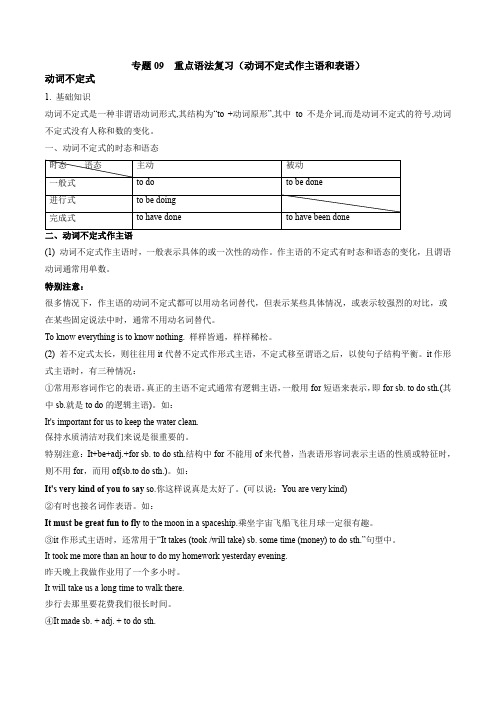动词不定式专题讲解
2023年中考英语语法专题:非谓语动词之动词不定式(to do)) 课件

3.用作宾补(V.+ sb. + to do)
eg: 她要我帮她 She asked me to help her.
eg: 老师告诉他让他准时来 The teacher told him to come on time.
eg: 汤姆的妈妈教他读英语 Tom’s mother taught him to read English.
动词不定式
定义:不定式的构成是to+动词原形,当然to有时也可 以省略。动词不定式没有人称和数的变化,可以作除谓语 外的任何成分。
肯定式:to + 动词原形 否定式:not to + 动词原形
1.用作主语
A.动词不定式做主语,谓语动词用单数。
eg: 眼见为真 To see is to believe. eg: 学好英语对我们来说很重要 To learn English well is important for us.
2.用作宾语(V.+ to do)
eg: 我想买一台新电脑 I want to buy a new computer. eg: 我决定回家 I decide to go home.
eg: 她希望能找到一份更好的工作 She hopes to find a better job.
常用动词不定式作宾语 的动词有:hope, refuse, learn, need, choose, decide, agree, start, begin, like, try, plan.
Practice
1. Let him __fin_i_sh__ (finish) the work at once. 2. ——Is Wang Fang good at drawing?
高中动词不定式详细讲解课件

三. 用法/ 功能
(1). 主语
To see is to believe. It’s important to learn English well .
1.单个不定式作主语时,谓语动词用单数 2.不定式作主语时,往往放在谓语之后,用it作形式 主语.
is
is
三. 用法/ 功能
什么叫非谓语动词?
1:当一个动词在句中做主语、宾语、表 语、宾补、定语或状语成份时就叫做非谓 语。
2.因为不同的成份必须用不同的词性,所 以做各种成份的动词必须要变化其形式才 能做对应的成份。
三 非谓语动词所表示的动作与谓语动词表示 的动作的先后关系是什么?
弄清非谓语动词表示的动作与谓语动词表示的动 作
之间的先后关系是解题的关键所在 非谓语表示的动作 非谓语动词的形式
在谓语表示的动作之后
与谓语表示的动作同时 发生
在谓语表示的动作之前
to do/to be
to ddoo/nteo be done /to be
doing ; doing/being done ;
done; to have done/to have been done ; having done/having been done
of: adj. 多为 描述主语的品质特征
(kind / nice / friendly / wise /
Iftooilsiseahsy等fo_.r_)_____ her to learn English
well.
of
It is clever ________ you to solve the
练习
主语
动
foolish。 I want to see you this evening. 宾语
专题03 动词不定式(人教版 九年级英语学习资料)

专题03 动词不定式核心考点聚焦 (1)考点一:动词不定式基础 (1)考点二:动词不定式的功能进阶版(中考难度) (2)1.不定式结构作主语 (2)2.不定式结构作表语 (3)3.不定式结构作动词宾语(见表格附录) (4)4.不定式结构作定语 (4)5.不定式结构作状语 (4)6.不定式结构作宾语补足语 (6)当堂限时检测 (7)课后提升专练 (9)参考答案: (11)核心考点聚焦考点一:动词不定式基础1.1.动词不定式的形式:基本形式为“to+动词原形”,否定形式为“not to+动词原形”。
例It's important not to be late for class.上课不迟到是非常重要的。
1.2.动词不定式的功能(1)动词不定式作状语。
作状语时,一般在句中作目的状语、结果状语和原因状语。
例We need more money to improve transport in London.我们需要更多的钱来改善伦敦的交通状况。
(2)动词不定式作主语。
常用it作形式主语,真正作主语的不定式后置。
常用句型为“Itis+adj.+(of/for sb.) to do sth.”。
例It's not easy to find your way around the town.在这个小镇上要找到路很不容易。
(3)动词不定式作宾语。
常接动词不定式作宾语的动词有:would like/want to 想要agree to同意afford to 负担得起hope/wish to 希望decide to决定promise to 承诺continue to 继续expect to 期望refuse to 拒绝(4)动词不定式作宾语补足语。
常接动词不定式作宾语补足语的动词:tell sb.to do sth.告诉某人做某事warn sb.to do sth.警告某人做某事invite sb. to do sth.邀请某人做某事allow sb.to do sth.允许某人做某事expect sb. to do sth.期望某人做某事advise sb.to do sth.建议某人做某事(5)动词不定式作定语。
动词不定式讲解

prefer等。
巧记动词不定式作宾语歌诀:
•
• • • • • • •
想要拒绝莫忘记 (want, refuse, forget) 需要努力就学习 (need, try, learn) 喜欢帮助加同意 (like help agree ) 希望决定后开始 (hope, decide, begin, start)
get to sleep. I feel it easy to recite the text
点击规律: 这些动词后面除接不定式外, 还可以接动名词, 意 思区别不大。
提示板:like
doing指经常性动作,而like to do指一次性的
动作。 I like swimming,but I don‘t like to swim now. 我喜欢游泳, 但我现在不想游。 begin\start to do sth begin\start doing sth love \hate to do sth love \hate doing sth
• He wants to be a singer
• 14. want doing
需要;该
• The tea table wants washing 茶几需要清洗了
• 15. need \require to do sth 需要做某事
• We need \require to do a lot of work
• 7. mean to do sth 打算做某事 • We mean to travel abroad next year
• 我们明年打算去国外旅行
• 8. mean doing sth 意味着
• It means waiting for him another hour
专题01 动词不定式八大用法(讲案)原卷版

【口袋书】2025年高考一轮复习学问清单专题01 动词不定式八大用法(讲案)解析版名目一、动词不定式快问快答P1二、动词不定式五年高考真题细目表P2考点清单一、不定式作主语典型用法P3考点清单二、不定式作宾语两种典型用法P3考点清单三、不定式作宾语补足语四种用法P5考点清单四、不定式作定语两种典型用法P6考点清单五、不定式作状语三种典型用法P7考点清单六、不定式作表语典型用法P8考点清单七、不定式三种典型省略用法P8考点清单八、动词不定式形式多样化P9分层训练(一)动词不定式五年高考真题题组P9分层训练(二)动词不定式易混对比十组P11分层训练(三)动词不定式助力应用文写作P12分层训练(四)动词不定式助力读后续写P12分层训练(五)外刊原创最新语法填空P13复旦高校为法籍教授魏明德办艺术展庆祝中法建交60周年P13一、动词不定式快问快答Q1:什么叫动词不定式?A1:动词不定式是非谓语动词一种形式,基本形式为to do。
Q2:动词不定式能充当什么成分?A2:动词不定式在句中作主语、宾语、表语、定语、状语或宾语补足语。
Q3:学习动词不定式难点在哪里?A3:一是熟记一些动词搭配,需要与不定式连用,二是需要区分不定式和动名词的区分,三是动词不定式形式的简单变化。
Q4:阅读过程中遇到动词不定式(短语)怎么办?A4:利用括号法把整个动词不定式括起来视为一个整体来理解。
Q5:学好动词不定式有什么意义?A5:一能化繁为简快速提高文章阅读力量,二能在书面表达奇妙运用动词不定式提升句子表达效果。
Q6:如何才能学好动词不定式?A6:一是努力把握动词不定式基本学问框架,二是加强训练和背诵,积少成多,见多识广。
二、动词不定式五年高考真题考点细目表考点清单一、不定式作主语典型用法【即时训练】用括号内所给单词的适当形式填空。
1. It took years of work _____________(reduce) the industrial pollution and clean the water.2. It’s important for the figures _____________(update) regularly.3. It is necessary for young students _____________(learn) to learn a foreign language.4. When and where to start the programs ____________(remain) unknown.5. (2019全国III) On our way to the house, it was raining so hard that we couldn't help wondering how long it would take __________ (get)there.6. (2028浙江) Many westerners who come to China cook much less than in their own countries once they realize how cheap can be to eat out.考点清单二、不定式作宾语两种典型用法【即时训练】用括号内所给单词的适当形式填空。
动词不定式(基础讲解)

动词不定式【概念引入】1. 动词不定式名言:(1)动词不定式作表语To lose is to learn. 失败就是学习。
(2)动词不定式作主语It is better to give than to take. 给予比接受更好。
(3)不定式作宾语Expect to be treated as you have treated others.你怎样待别人,就指望别人怎样待你。
(4)不定式作宾补Adversity causes some men to break,others to break records.逆境使一些人崩溃,也使一些人破记录。
(5)不定式作定语There is a time to talk and a time to act.该说的时候说,该做的时候做。
(6)不定式作目的状语To find the exact answer,one must first ask the exact question.要找到确切的答案,首先必须提出确切的问题。
2. 动词不定式定义:动词不定式是一种非谓语形式(不能作谓语),基本形式是to do形式(to是不定式符号的标志,无意义,可以不翻译)肯定式:to + 动词原形否定式:not to + 动词原形【用法讲解】1.动词不定式的特征动词不定动式是一种非谓语动词形式,它没有人称和数的变化,在句子中不能作谓语,但可以作除谓语之外的其它任何句子成分(主语、表语、宾语、宾语补足语、定语和状语);动词不定式具有名词、形容词和副词的特征,同时还保持动词的某些特点,既可以有自己的宾语和状语,动词不定式和它的宾语和状语构成不定式短语。
2. 动词不定式在句子中的作用动词不定式是由to+动词原形构成,在句中起名词,形容词和副词的作用,可以担任除谓语以外的其它任何成分。
(1)动词不定式作主语。
例如:To master a language is not an easy thing.掌握一门语言不是一件容易的事情。
动词不定式知识点总结讲解学习

动词不定式知识点总结知识点总结不定式的语法功能:除不能作谓语,其他句子成分都可。
1.不定式作主语To see is to believe.常用it作形式主语It''s for sb/It''s of sb1)for sb. 常用于表示事物的特征特点,表示客观形式的形容词,如easy, hard, difficult, interesting, impossible等:It''s very hard for him to study two languages.2)of sb的句型一般用表示人物的性格,品德,表示主观感情或态度的形容词,如good, kind, nice, clever, foolish, cruel, right。
It''s very nice of you to help me2.不定式作宾语I want to speak to Tom.Please show us how to do that.3.不定式作宾补a. Father will not allow us to play on the street.b. We believe him to be guilty.4.不定式作表语不定式可放在be动词后面,形成表语。
例如:My work is to clean the room every day.5.不定式作定语不定式做定语通常要放在被修饰的词后。
例如:I have a lot of work to do.6.不定式作状语1)目的状语to… ,only to (仅仅为了),in order to, so as to, so(such)… as to… (如此……以便……) He ran so fast as to catch the first bus.I come here only to say good-bye to you.2)结果状语What have I said to make you angry.He searched the room only to find nothing.3)原因状语I''m glad to see you.用作介词的toto 有两种用法:一为不定式+动词原形; 一为介词+名词/动名词, to 在下面的用法中是第二种,即to+ 名词/动名词:admit to承认,confess to承认,be accustomed to 习惯于,be used to 习惯于,stick to 坚持,turn to开始,着手于,devote oneself to 献身于,be devoted to 致力于, look forward to 盼望,pay attention to 注意省to 的动词不定式1) 情态动词 ( 除ought 外,ought to):2) 使役动词 let, have, make:3) 感官动词 see, watch, look at, notice , observe, hear, listen to, smell, feel, find 等后作宾补,省略to。
动词不定式精讲

动词不定式精讲1. 作主语作主语的不定式如果很短,通常位于句首,如:To see is to believe.若不定式(短语)较长时,常用it作形式主语,而把真正的主语(即动词不定式)放在后面,以避免头重脚轻。
常见句型为:“It”s +名词(for + sb)+ to do sth“和”It“s +形容词(for / of + sb)+ to do sth”。
注意:在这个句型结构中,若形容词表示与人有关的“赞美”或“批评”时用of,如kind,nice,good,clever,bad等;否则用for.如:It“s easy for you to answer the question.It“s very kind of you to help me.2. 作表语动词不定式可以作be,seem,appear等系动词的表语。
如:Her job is to take care of these children.3. 作状语动词不定式放在come,go,stop等动词后作目的状语;放在sorry,glad,surprised,pleased,angry等形容词后作原因状语;动词不定式作状语表示结果时常与副词too或enough连用。
注意:too…to与so…that…和(not)…enough to…可以相互转换:如:She is so weak that she can“t move the box.=She is too weak to move the box.=She is not strong enough to move the box.4. 疑问词+不定式疑问词+不定式=名词短语,可作主语、宾语或表语。
注意:名词短语可以由名词从句转换而来;疑问代词what,which,whom可以作宾语,疑问副词how,when,where,whether不能作宾语。
如:I didn“t know what I should do. = I didn”t know wheat to do.I didn“t know how I should do it. = I didn”t know how to do it.5. 几种不带to的动词不定式句式had better…, Why not…? Will / Would you please…?等句型后接不带to的不定式。
八年级英语动词不定式+双宾语讲解及练习

八年级英语动词不定式+双宾语讲解及练习专题三:动词不定式+双宾语一.动词不定式含义当我们要表示“想做某事、需要做某事或决定做某事”时,就会出现两个动词连用的情况,这时应如何表达呢?同学们自然会想到want to do sth。
need to do sth.和decide to do sth.等表达方式。
行为动词后的动词都采用了“to+动词原形”的结构。
我们把这种结构称为动词不定式。
动词不定式没有人称和数的变化,在句中不能作谓语。
二.动词不定式的功能1.动词不定式作宾语(1)动词+to do sth.表示的多为将来的行为。
如:want to do sth。
/ hope to do sth。
/ learn to do sth。
/ try to do sth。
/ decide to do sth。
/ forget to doXXX to do sth。
/ stop to do sth./ plan to do sth.等(2)to偶然可省略,布局为动词+do sth.had better do sth。
/ why not do sth.2.动词不定式作宾语补足语(1)宾语补足语是对宾语的补充说明,结构:“动词+宾语+动词不定式”。
其否定结构要在todo前面加not,构成not to do。
如:allow sb。
to do sth。
/ choose sb。
to do sth。
/ want sb。
to do sth。
/ tell sb。
to do sth。
/ ask sb。
to doXXX(2)在表示感觉、祈使等意义的动词help。
make。
let。
have。
feel。
see等后接不带to的不定式。
3.动词不定式作目的状语(1)假如透露表现“做某事是为了甚么”,能够用动词不定式透露表现目标,常与soas,in order等组成短语不定式既可以放在句首,也可以放在句尾。
如:XXX to have rest.=To have rest。
高考英语动词不定式精讲解课件(共34张PPT)

He studied hard only to fail the exam. The road is too dangerous to cross.
请告诉你的小孩不要在街上玩耍。
Please tell your child not to play in the street.
她检查名字为了不犯错误。
She checked the names so as not to make mistakes.
三、时态和语态
一般式 进行式 完成式
主动形式 to do
C. 不定式做原因状语, 一般用在句尾 I’m glad to see you. They are quite surprised to see the great changes taking place in the area.
(6). 做宾语补足语
A. 常带to的不定式做宾语补足语的动词有: ask,
allow, require, advise, permit, expect, get,
forbid, invite, persuade, urge, order, force, cause, encourage等
结构: ask / allow sb. to do sth./ sth. to be done
5. “Have you decided when _A____?” “Yes,
4. T__o_m__a_k_e_(make) things worse, my car was held up by the traffic accident.
动词不定式的用法讲解

动词不定式的用法讲解动词不定式是英语语法中的一个重要部分,它具有丰富的用法和多样的功能。
理解和掌握动词不定式对于学好英语、正确表达意思至关重要。
接下来,让我们详细探讨一下动词不定式的用法。
一、作主语动词不定式作主语时,通常表示具体的、一次性的或未发生的动作。
为了保持句子平衡,常用 it 作形式主语,而将真正的主语(动词不定式)后置。
例如:“To learn English well is not easy”(学好英语不容易。
)但这个句子头重脚轻,所以通常会改为:“It is not easy to learn English well”二、作宾语有些动词后只能接动词不定式作宾语,常见的这类动词有:want(想要),hope(希望),wish(希望),decide(决定),plan(计划),expect(期望)等。
比如:“I want to go shopping this weekend”(这个周末我想去购物。
)“She decided to study harder”(她决定更努力学习。
)三、作宾语补足语某些动词后需要用动词不定式作宾语补足语,常见的有:ask(要求),tell(告诉),want(想要),allow(允许),encourage(鼓励)等。
例如:“My mother asks me to clean my room every day”(我妈妈每天要求我打扫房间。
)“The teacher encourages us to speak English more”(老师鼓励我们多说英语。
)四、作定语动词不定式作定语时,通常放在被修饰词之后,与被修饰词之间存在逻辑上的动宾关系。
例如:“I have a lot of work to do”(我有很多工作要做。
)“There is no time to waste”(没有时间可以浪费。
)五、作状语1、目的状语动词不定式可以作目的状语,表示某一动作或行为的目的。
专题09重点语法复习动词不定式作主语和表语

专题09 重点语法复习(动词不定式作主语和表语)动词不定式1. 基础知识动词不定式是一种非谓语动词形式,其结构为“to +动词原形”,其中to 不是介词,而是动词不定式的符号,动词不定式没有人称和数的变化。
一、动词不定式的时态和语态(1) 动词不定式作主语时,一般表示具体的或一次性的动作。
作主语的不定式有时态和语态的变化,且谓语动词通常用单数。
特别注意:很多情况下,作主语的动词不定式都可以用动名词替代,但表示某些具体情况,或表示较强烈的对比,或在某些固定说法中时,通常不用动名词替代。
To know everything is to know nothing. 样样皆通,样样稀松。
(2) 若不定式太长,则往往用it代替不定式作形式主语,不定式移至谓语之后,以使句子结构平衡。
it作形式主语时,有三种情况:①常用形容词作它的表语。
真正的主语不定式通常有逻辑主语,一般用for短语来表示,即for sb. to do sth.(其中sb.就是to do的逻辑主语)。
如:It's important for us to keep the water clean.保持水质清洁对我们来说是很重要的。
特别注意:It+be+adj.+for sb. to do sth.结构中for不能用of来代替,当表语形容词表示主语的性质或特征时,则不用for,而用of(sb.to do sth.)。
如:It's very kind of you to say so.你这样说真是太好了。
(可以说:You are very kind)②有时也接名词作表语。
如:It must be great fun to fly to the moon in a spaceship.乘坐宇宙飞船飞往月球一定很有趣。
③it作形式主语时,还常用于“It takes (took /will take) sb. some time (money) to do sth.”句型中。
2023年牛津译林版中考英语 动词不定式语法讲解 专题练习【附答案】

中考动词不定式(to do)讲解+专练[附答案]在英语句子中,动词有两种。
一种是谓语动词,另一种是非谓语动词。
动词不定式就属于非谓语动词。
动词不定式没有人称、数和时态的变化。
不受主语人称和谓语动词的时态变化影响。
在句子中不能单独做谓语,但仍要保留动词的特点,既可以有自己的宾语和状语。
一.动词不定式的基本形式;不定式的基本形式是to+动词原形,to没有任何意义,不翻译。
不定式的否定形式在不定式前+not/never即可。
二.动词不定式的句法作用1.动词不定式作主语动词不定式可以用作句子中的主语,这时谓语动词要用单数。
Eg:To see is easy ,but to do is difficult.To ask him for help is necessary.To help poor people is our duty.★当动词不定式做主语时,如果带有宾语或状语,那么主语就会很长。
这时,常用it来代替不定式做形式主语,而将真正的主语---不定式,转移到谓语之后,以避免句子结构头重脚轻。
Eg:It is necessary to ask him for help.It is our duty to help poor people.It is not easy to master a foreign language.It took us two hours to get there by bike.★如果要说明不定式的动作是谁做的,不定式前要用for引起的短语。
常用结构是It be+adj+for sb+to do sth.翻译为“做某事对于某人来说是怎么样的?Eg:It is important for us to study English well.It is difficult for him to answer these questions.★如果某些表示人的品行的形容词,例kind,good,nice,wrong,careless,wise,foolish,polite,clever,right,unwise,stupid,thoughtful,rude,silly,impolite等等作表语时,不定式前要用of引起的短语。
动词不定式讲解

动词不定式一、不定式的构成及变形动词不定式是由不定式符号to+动词原形构成,在某些情况下to也可省略。
⒈不定式的一般式不定式的一般式表示的动作通常与谓语的动作同时或几乎同时发生,或是在它之后发生。
如:He appears to be very happy.(同时发生)To catch the train, we'd better hurry to the station by taxi.(to catch the train发生在hurry to the station之后)⒉不定式的进行式不定式的进行式表示正在进行的或与谓语动词同时发生的动作。
如:It happened to be raining when I got there.⒊不定式的完成式不定式的完成式表示的动作在谓语表示的动作之前发生。
如:I'm sorry to have lost your key.⒋不定式的完成进行式不定式的完成进行式表示的动作在谓语之前发生并且一直进行着。
如:He was said to have been living in London for twenty years.不定式的时态意义:如:He is said to be studying abroad.(不定式的进行式表示动作正在进行)He is said to have studied abroad.(不定式的完成式表示动作已经结束)⒌不定式的被动形式当不定式逻辑上的主语是这个不定式表示的动作的承受者时,不定式一般要用被动形式。
不定式的被动形式根据其与谓语动作发生的先后关系,有一般式和完成时两种。
①一般式to be done如:These are the books to be given out to the students.②完成式to have been done如:The novel is said to have been translated into many languages.⒍不定式的否定形式不定式的否定形式由not或never加不定式构成。
- 1、下载文档前请自行甄别文档内容的完整性,平台不提供额外的编辑、内容补充、找答案等附加服务。
- 2、"仅部分预览"的文档,不可在线预览部分如存在完整性等问题,可反馈申请退款(可完整预览的文档不适用该条件!)。
- 3、如文档侵犯您的权益,请联系客服反馈,我们会尽快为您处理(人工客服工作时间:9:00-18:30)。
动词不定式作状语
不定式作状语可以表示行为的目的、结果、原因、条件等。 1. 表示目的 I’m saving up to buy a computer.
有时为了强调或突出这种目的,也可以用in order (not) to do, 和so as (not) to do结构 (so as to do不可以置于句首)。
不定式:是一种非限定性动词。 1.非限定动词:是指那些在句中不能单独充当
谓语的动词; 2.动词不定式在句中可以作句子除谓语之外
的任何句子成分。 3.动词不定式没有人称和数的变化。
一、不定式的构成
1) 基本形式: to+动词原形 2) 其否定形式是: “not/never to do”/not do. 3) 不定式可以带宾语或状语构成不定式短语,
I wish you to stay with us.
7) Her story made us laugh. (改成被动句) We were made to laugh by her story.
动词不定式作定语
位置: 放在被修饰词的后面 I have a lot of work to do. I want to find something to drink.
have
notice
listen to
二听
一感觉 feel
hear
注意
1> help 后面的“to”可省去
e.g. They often help the grandma (to) carry water.
2> see, hear, watch, feel, notice, look at等表示 感觉和let, make, have等表示使役的动词后 面,不定式作宾语时要省“to” (注:被动 语态不省to)
2)To waste time is to shorten life. (翻译成中文) 浪费时间就是缩短生命。
动词不定式作宾语
动词+ to do sth.
常用动词有:
want / wish / like / would like / hope / plan / try / decide / learn / need / agree / begin / start / forget / remember / manage / seem / fail/ manage/ promise等
warn, tell, allow, help, ask, force等
作宾补
The teacher told me to clean the blackboard.
I expect you to give me some help.
watch
let
五看
see
三使 make
look at observe
必 背 : 不定式表示结果常见于下列句型
1) so...as to do Would you be so kind as to lend me your
bicycle? 2) such...as to do
We are not such fools as to believe him. 3) enough to do
动词不定式作宾补
1、动词 + 宾语(sb./sth.) + to do sth.
1)The teacher asked her to answer the question. 2)The doctor told me to have a good rest. 常用动词有:ask, tell, allow, want 等
He didn't run fast enough to catch the train. 4) only to do
He lifted a rock only to drop it on his own feet. 5) too...to do
His eyesight is too poor to read such small letters.
答案:B. make后接不带to 的动词不定式,当其用 于被动时,to 不可省略。
3> 不定式用在介词but, except, besides后时, 如果这些介词前有行为动词do的各种形式,那 么介词后的不定式不带to,相反则带to.
1) She could do nothing but cry. 2) I have no choice but to go. 3)What do you like to do besides sleep.
1. 单个不定式作主语时,谓语动词用单数。 2. 不定式作主语时,往往放在谓语之后,用it 作形式主语。
动词不定式作主语
It +be + adj. +for/of sb. to do sth. for: adj.多 为 描 述 不 定 式 行 为 的 特 征 ( important/ necessary / interesting 等.) of: adj. 多为 描述主语的品质特征 (kind / nice / friendly / wise / foolish 等.)
Practise
• 1.He got up early so that he could catch the first bus to the town.
• He got up early_____ _____ _____ catch the first bus to the town.
练习
1) Let him __f_in_i_s_h_ the work at once. (finish / to finish)
2) Do you like listening to other people__t_a_lk__? (talk / talking/to talk )
3) Jim was seen __t_o_e_n_t_e_r_the room. (enter /to enter )
不定式为不及物动词时后面应有必要的介词。 I’m looking for a hotel ___D____. A. stay B. stay at C. to stay D. to stay at
动词不定式作定语
I have something to say. He has a lot of homework to do . He is looking for a room to live in . There is nothing to worry about.
式 She came here to study English. 状语
I warned the patient not to eat cold water after the operation. 宾补
三、用法/功能
动词不定式作主语
To see is to believe. It’s important to learn English well .
没有人称和数的变化。
二、动词不定式的结构
肯定: to + V.原 或者 (to)+ V.原 否定:not/never + (to) + V.原
1) He likes to read novels. 2) I saw him come. 3) We decided not to buy that house. 4) It is interesting to fly a kite. 5) Please let him not go there.
e.g. I made him do his work.
He was made to do his work (by me).
典型例题
1) I usually go there by train.
Why not ___ by boat for a change?
A. to try going
B. trying to go
﹚ every day .
to do
3. The old man has a house
_________ ﹙住﹚.
to live in
4. She is a nice person__________ ﹙
共事﹚ .
to work with
4. something, anything, nothing, everything 等复合不定代词常用不定式做后置定语。
To do that sort of thing is foolish。主语
I want to see you this evening. 宾语
动
词 All you have to do is to finish it quickly. 表语
不 定
We found a house to live in. 定语
C. to try and go D. try going
答案:D. why not 后面接不带to 的不定式,因此 选D。
2) made ___. He always works hard.
A. learn B. to learn C. learned D. learning
动词不定式作表语
主语 + be + to do sth
主语多为 duty / wish / hope / idea / plan / ambition/ dream / work / job 等 名词
我的梦想是成为一名歌手。 他的工作是每天清扫教室。 1) My dream is to be a singer. 2) His work is to clean the classroom every day.
